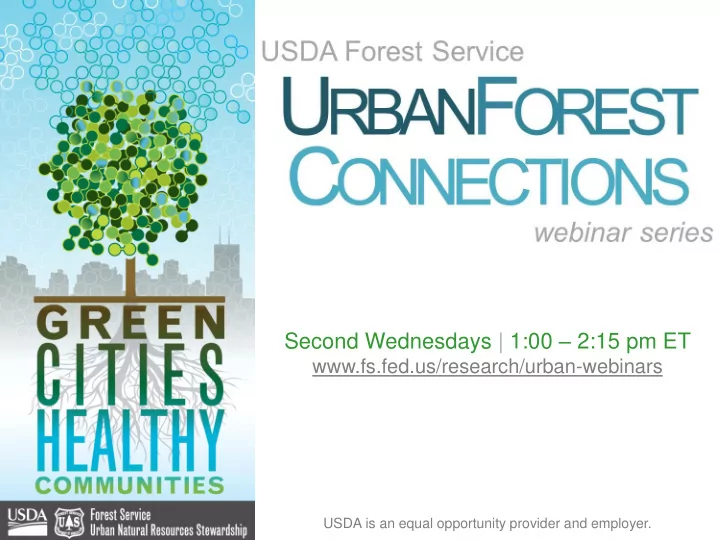

Second Wednesdays | 1:00 – 2:15 pm ET www.fs.fed.us/research/urban-webinars USDA is an equal opportunity provider and employer.
Leslie Brandt Justin Evertson Climate Change Specialist Green Infrastructure Coordinator USDA Forest Service Nebraska Forest Service & Nebraska Statewide Arboretum lbrandt@fs.fed.us jevertson1@unl.edu
A FRAMEWORK FOR ADAPTING OUR URBAN FORESTS TO A CHANGING CLIMATE Leslie Brandt, PhD Climate Change Specialist
R ISING T EMPS IN THE US Tebaldi et al. www.climatecentral.org
U RBAN H EAT I SLAND E FFECT
H EAVY P RECIPITATION I S I NCREASING 40% more extreme rain events in the United States. National Climate Assessment, 2014
S TORMWATER R UNOFF http://www.mdcoastalbays.org/bayissues-stormwater-management
U RBAN F ORESTS : A C LIMATE A DAPTATION S TRATEGY ? Cities that include trees as part of their climate change/sustainability goals in climate action plans States that have developed comprehensive Climate Action Plans, using forests to help adapt/mitigate Cities that view trees as part of their overall sustainability/climate protection efforts Ten-Year Urban Forestry Action Plan: 2016 -2026 National Urban and Community Forestry Advisory Council
B UT … U RBAN F ORESTS F ACE C LIMATE C HANGE C HALLENGES Flooding Drought Storms Disease
Goal 4B: Foster resilience, restoration, and sustainability of urban and community forests facing climate change challenges.
HOW?
U RBAN F ORESTRY C LIMATE C HANGE R ESPONSE F RAMEWORK Brandt et al. 2016. Environmental Science and Policy
P ILOT U RBAN AREA : C HICAGO W ILDERNESS
K EY P ARTNERS
U RBAN F RAMEWORK A PPROACH
V ULNERABILITY High Low Vulnerability Adaptive Capacity Moderate Moderate Vulnerability High Vulnerability Low Positive Moderate Negative Potential Impacts modified from Swanston and Janowiak 2012
I MPACTS : N ATIVE S PECIES http://www.fs.fed.us/nrs/atlas/
I MPACTS : N ATIVE S PECIES Black Cherry: Future Projected Habitat Low Black Cherry : Current Habitat emissions High emissions http://www.fs.fed.us/nrs/atlas/
I MPACTS : N ON -N ATIVE S PECIES AND C ULTIVARS Hardiness Zone Changes Heat Zone Changes Zones 4-6 Zones 6 Zones 7-8 Zones 7-8
A DAPTIVE C APACITY F ACTORS Based on Matthews et al. 2011 Disturbance Factors Pest, disease, fire, drought, flood, pollution, heat, herbivory, invasive species, salt resistance Biological Factors Shade tolerance, edaphic specificity, propagation, pruning needed, establishment, rooting conditions -3 0 3
P UTTING IT T OGETHER : N ATIVE S PECIES ( EXAMPLE ) Impacts Adaptive Vulnerability Capacity • Negative: • Low: • High Tree Atlas Species is Model susceptible shows to drought, decline in insects, suitable disease habitat
HOW MANY TREES ARE VULNERABLE IN THE CHICAGO REGION?
V ULNERABILITY OF T REES IN C HICAGO R EGION % of Trees Inventoried 10% 6% high moderate-high 16% moderate 50% low-moderate low 18%
V ULNERABILITY : N ATIVE V S . I NVASIVE S PECIES % of Native Trees % of Invasive Species 2% 3% 7% 18% 20% high moderate-high 9% moderate low-moderate low 26% 88% 27%
U RBAN F RAMEWORK A PPROACH
P ILOT C OMMUNITIES
V ULNERABILITY W ORKSHOP Presentations on climate change, tree impacts Information on local changes in heat and hardiness zones, tree species vulnerability Facilitated local assessment process
Overall Location Impacts Adaptive Capacity Vulnerability Riverside moderate high low-moderate Lake Forest moderate-negative moderate-high moderate Hazel Crest moderate-negative low-moderate moderate-high Glenview moderate-negative high moderate Glencoe Parks moderate-negative low-moderate moderate-high Wheaton Parks moderate-negative high moderate Chicago Parks moderate-negative moderate-high low-moderate Southern Des Plaines River moderate-negative high moderate Preserves Freeman Kame moderate-negative moderate-high moderate Preserve Swallow Cliff moderate-negative low-moderate moderate-high Preserve
U RBAN F RAMEWORK A PPROACH
A DAPTATION W ORKSHOP Same participants from vulnerability workshop Bring a real world project Presentations on adaptation concepts Facilitate participants through structured process
F OREST A DAPTATION R ESOURCES Designed for a variety of land managers with various goals and objectives Tailored to eastern forests in rural and urban areas Does not make recommendations Two menus of adaptation strategies & approaches, including one for urban forest ecosystems http://www.fs.fed.us/nrs/pubs/gtr/gtr_nrs87-2.pdf
F OREST A DAPTATION R ESOURCES : A DAPTATION W ORKBOOK Vulnerability Define goal Assessment Monitor Assess effectiveness vulnerabilities Adaptation Strategies Identify Evaluate and adaptation objectives Approaches strategies http://www.fs.fed.us/nrs/pubs/gtr/gtr_nrs87-2.pdf
A DAPTATION O PTIONS Resistance Resilience Transition Reduce impacts/ Forward-looking/ Maintain current Promote change conditions
Projects Option Adaptation Strategies Selected Prevent the introductions and establishment of Resist Change 4 invasive plant species and remove existing invasives Promptly remove major hazards 4 Retain biological legacies 2 Resilience Maintain, restore, enhance native species diversity 3 Enhance Manage and restore hydrology 3 Promote diverse age structure 2 Select tree species to match current and future site Transitions 2 Facilitate conditions Introduce species that are expected to be adapted to 2 future conditions Maintain or improve the ability of forests to resist pests 2 & pathogens
P ILOT O UTCOMES Increased knowledge of local climate change impacts. Structured process to incorporate climate considerations. Greater familiarity with adaptation concepts. Empowerment: everyone can do something. “This is a great process to go through. It breaks from the typical “Putting out fires” philosophy” – participant evaluation “I think that the climate change topic can be intimidating and that many urban foresters will think there is nothing they can do. [We are] connecting how their current practices are actually a step in the right direction.” – participant evaluation
N EXT S TEPS Chicago assessment-in press! Expand to other areas Twin Cities workshop-November Boston workshop-January Philadelphia workshop-March Online Adaptation Workbook- expand to urban
O NLINE W ORKBOOK : B EING U PDATED FOR U RBAN F ORESTERS www.Adaptationworkbook.org
L EARN M ORE www.forestadaptation.org/urban lbrandt@fs.fed.us
Recommend
More recommend